Key takeaways:
- Antivirus programs are essential for protecting computers from evolving cyber threats, utilizing both detection and proactive measures.
- Key features to prioritize when choosing antivirus software include real-time scanning, a robust firewall, and a user-friendly interface.
- Regular updates and personalized settings can significantly enhance antivirus effectiveness and overall system performance.
- Recommended antivirus options are Bitdefender, Kaspersky, and Norton, each offering unique strengths in threat detection and comprehensive protection.
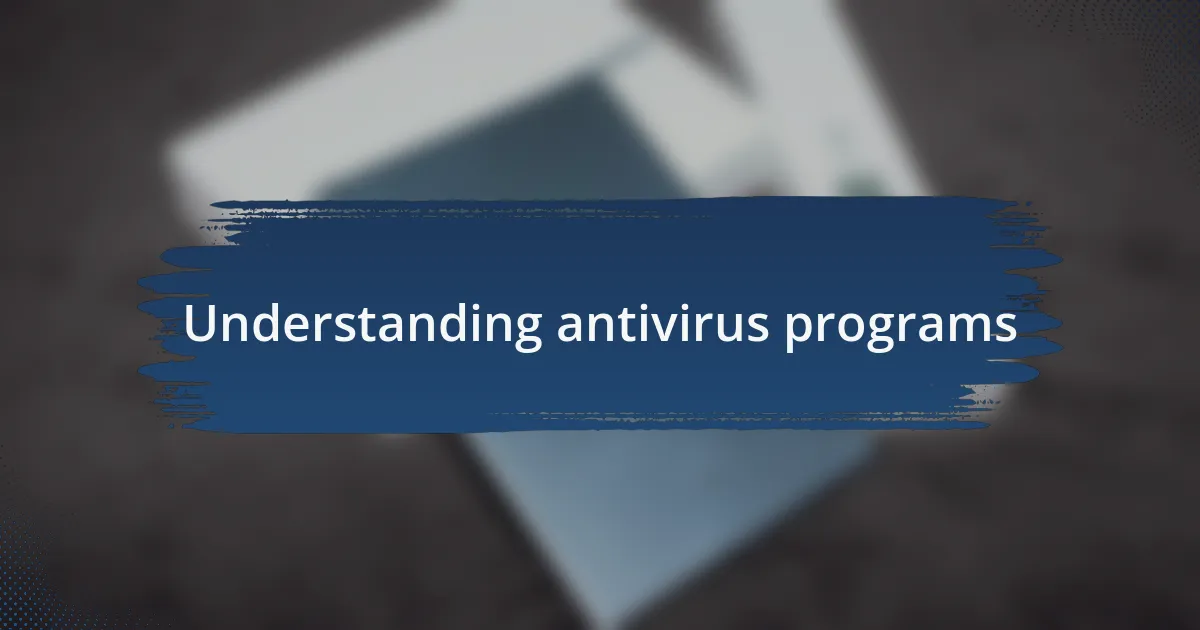
Understanding antivirus programs
Antivirus programs function as a digital shield against malicious threats lurking on your computer. I remember a time when my system was compromised, and it felt like a violation of my digital privacy. That incident really drove home the importance of having reliable antivirus software.
What I admire about these programs is their dual role—they not only detect known threats but also adapt to new malware through heuristics. Have you ever thought about how quickly cyber threats evolve? It’s fascinating to see how technology needs to keep pace with these changes, ensuring we stay one step ahead of potential dangers.
Additionally, my experience shows that consistent updates are crucial. I often find myself amazed at how some antivirus programs can identify threats even before they materialize. It’s a bit like having a watchful guardian monitoring your system day and night, which brings me peace of mind in an increasingly connected world.
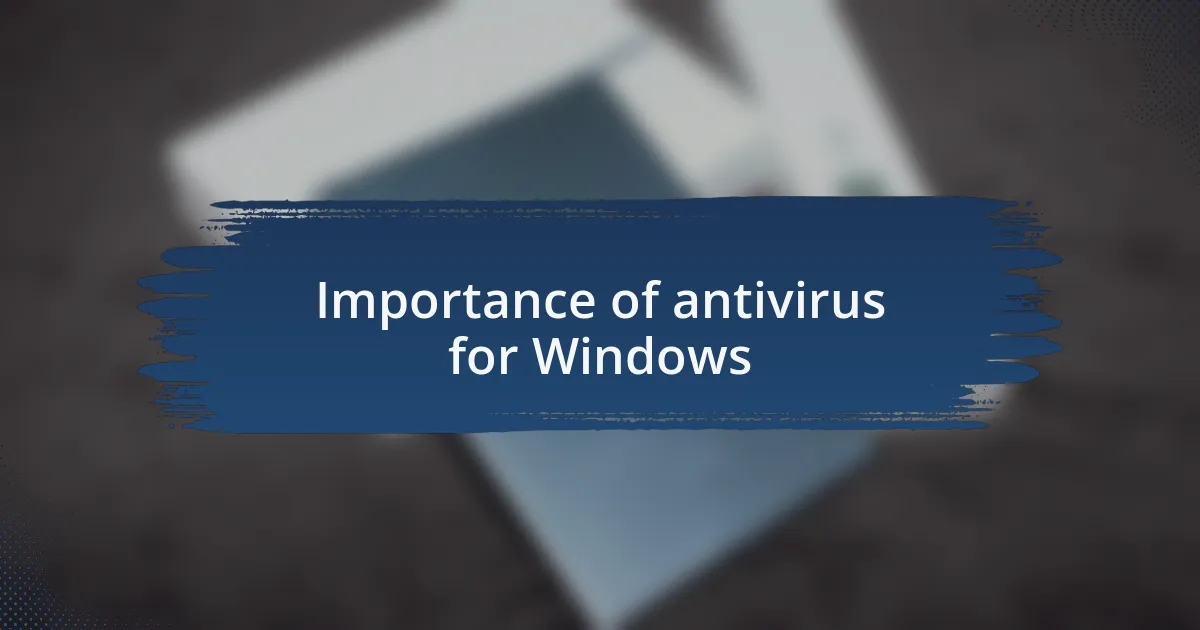
Importance of antivirus for Windows
Antivirus software is essential for Windows users because it acts as the first line of defense against the myriad of cyber threats we face daily. I distinctly remember a moment when I opened a deceptively harmless email attachment; it turned my computer into a playground for malware. That experience taught me that even a single lapse in vigilance can lead to significant consequences, emphasizing why an effective antivirus is non-negotiable.
Furthermore, having antivirus protection isn’t just about avoiding malware; it’s about safeguarding my personal information. There was a time when I received notifications about attempted breaches on my system, and I felt an overwhelming sense of relief knowing my antivirus was actively blocking intrusions. This not only protects my data but also fosters a sense of security and trust in my digital environment.
Moreover, the importance of antivirus programs extends beyond individual users to the entire ecosystem of Windows devices. Think about how interconnected our devices are nowadays. Every device I connect increases my risk of exposure, making reliable antivirus software a crucial element in a broader security strategy. Isn’t it reassuring to know that, with the right protection, I can navigate the digital world with confidence?

Key features to look for
When evaluating antivirus programs, I’ve found that real-time scanning is a feature I cannot overlook. This capability ensures that potential threats are identified and quarantined as I browse the internet or download files. I remember being shocked once when a download I thought was harmless triggered an alert—it reinforced just how critical this feature is for active protection.
Another essential feature I prioritize is a robust firewall. Having a strong firewall feels like having an extra layer of security around my device. I can still recall the sense of reassurance I felt when my antivirus flagged suspicious network activity, blocking what could have been a serious breach. It sparks the question: what good is an antivirus if it doesn’t actively guard my connection, right?
Lastly, I look for a user-friendly interface. A lifetime of managing various software taught me that clarity and ease of use can make all the difference in maintaining consistent protection. I once struggled with a highly complex program that left me frustrated; now, I always seek software that lets me focus on security without excessive navigating—simplicity is key. How about you? What features resonate most with your security needs?
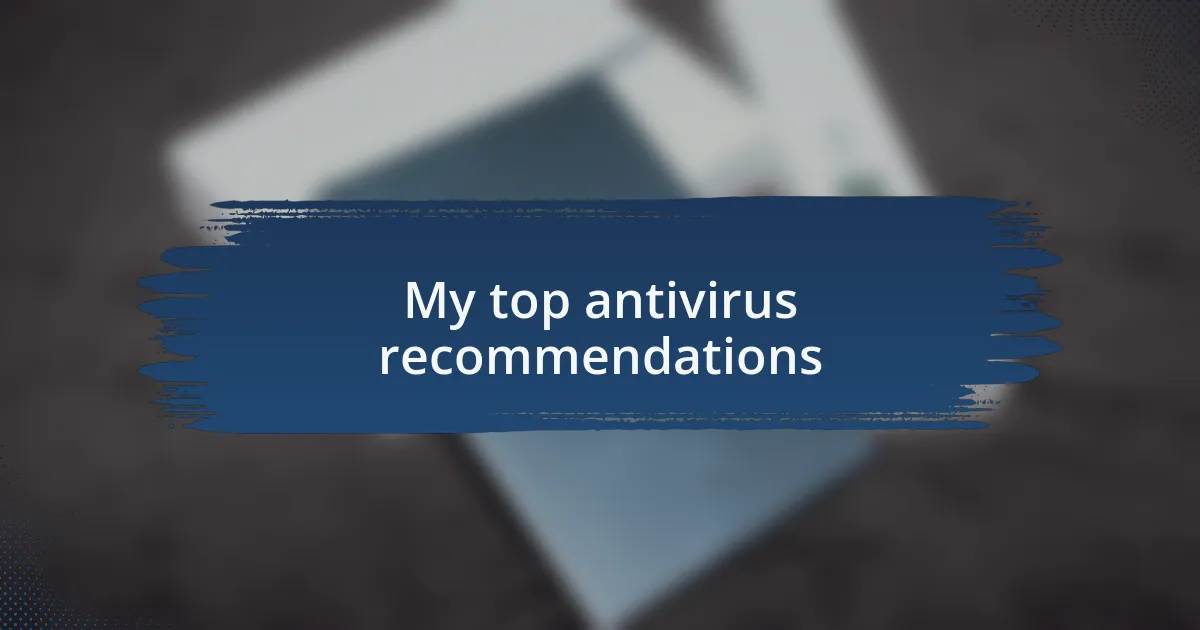
My top antivirus recommendations
When it comes to antivirus recommendations, I have to say that Bitdefender has consistently impressed me. I remember using it during a particularly frantic week when I had multiple important projects due; its performance was seamless. The way it swiftly scans for malware without hampering my system’s speed felt like a breath of fresh air. Have you ever had a program slow you down when you need your computer to work at its best? Bitdefender makes sure that doesn’t happen.
Another favorite of mine is Kaspersky. I appreciate its proactive response to emerging threats, which has saved me from several potential disasters. I distinctly recall a moment when I clicked a link in an email that seemed innocuous, only for Kaspersky to flag it as a phishing attempt. It was like a guardian angel swooping in—I still think about how easily I could have compromised my sensitive information. Can you imagine falling prey to such a scheme when you have so much online?
Finally, I often recommend Norton for its comprehensive protection. I love how it goes beyond standard antivirus features, offering tools like a password manager and VPN. Using Norton feels like having a full security suite at my fingertips, and I can’t underestimate the peace of mind that brings. I still remember the relief I felt the first time I used its secure VPN while working on public Wi-Fi; it made all the difference in how safe I felt online. Isn’t it reassuring to know that you’re covered from all angles?
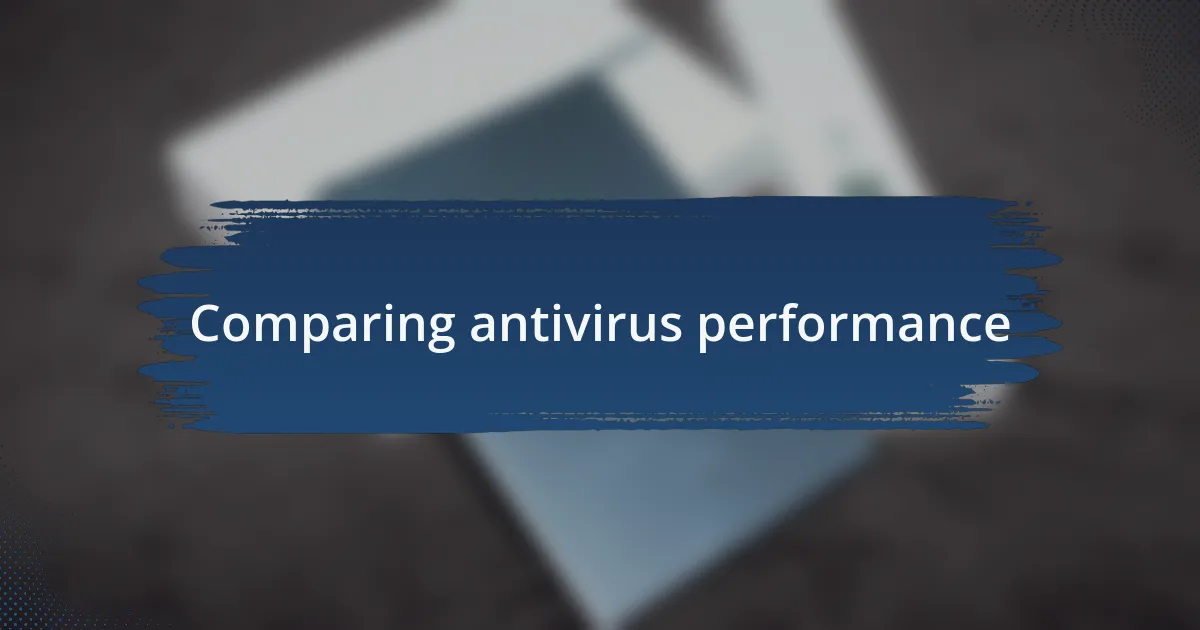
Comparing antivirus performance
When comparing antivirus performance, I’ve noticed that speed and efficiency are crucial. For instance, I once ran a full system scan with one popular program, and it felt like I was watching paint dry. In contrast, I chose to try a lesser-known antivirus the next time, and it amazed me with its rapid scanning capabilities—almost as if it was designed for speed. Isn’t it surprising how much our productivity can hinge on something like scan speed?
Another important factor is real-time protection, which can be a game-changer. There was a time when I encountered a suspicious download, and my antivirus sprang into action within seconds, quarantining the threat before it could even touch my files. This experience taught me that having a software that prioritizes real-time detection is not just a nice-to-have; it’s essential. Have you ever considered how a delayed response can spell disaster for your data security?
Finally, I often reflect on the user interface’s usability when comparing antivirus programs. I remember struggling with a convoluted interface that left me more frustrated than secure. Ignoring ease of use can lead to missed features or, even worse, overlooked threats. Doesn’t it make perfect sense to choose an antivirus that balances performance and user-friendliness?
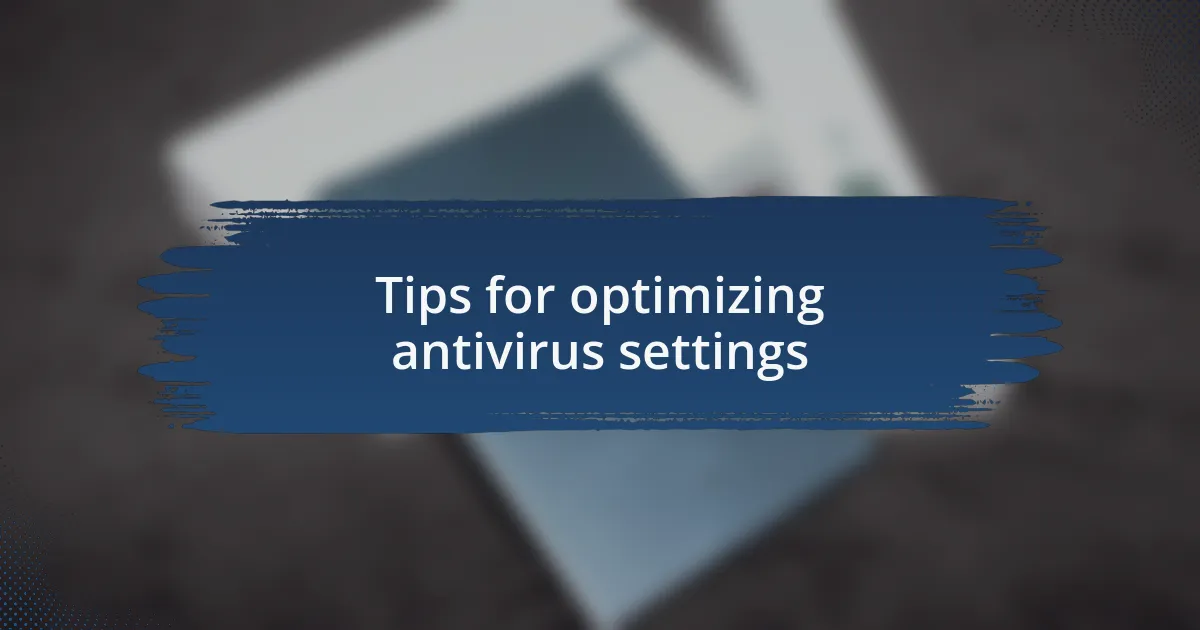
Tips for optimizing antivirus settings
When optimizing antivirus settings, I’ve learned that adjusting the scan schedule can make a significant difference. I once had my software set to full scans every day, which really bogged down my system during peak hours. Shifting it to run weekly during off-peak times not only spared my productivity but also kept my computer running smoother; could a simple scheduling tweak really enhance your experience?
Another tip is to personalize your protection levels. I remember the first time I tried a new antivirus program that offered various profiles. I started with the default settings, but soon realized that customizing them to suit my needs—like adding specific folders for frequent scans—provided an extra layer of security. Have you experimented with adjusting your settings based on your usage habits?
Lastly, I recommend being proactive with updates. In my experience, keeping the software current can be a real lifesaver. I once let my updates lapse for a couple of weeks, and it was alarming to see how quickly new threats surfaced in that time. Regular updates not only help safeguard against evolving malware but also ensure that you’re getting the most from your antivirus investment. How often do you check for updates?
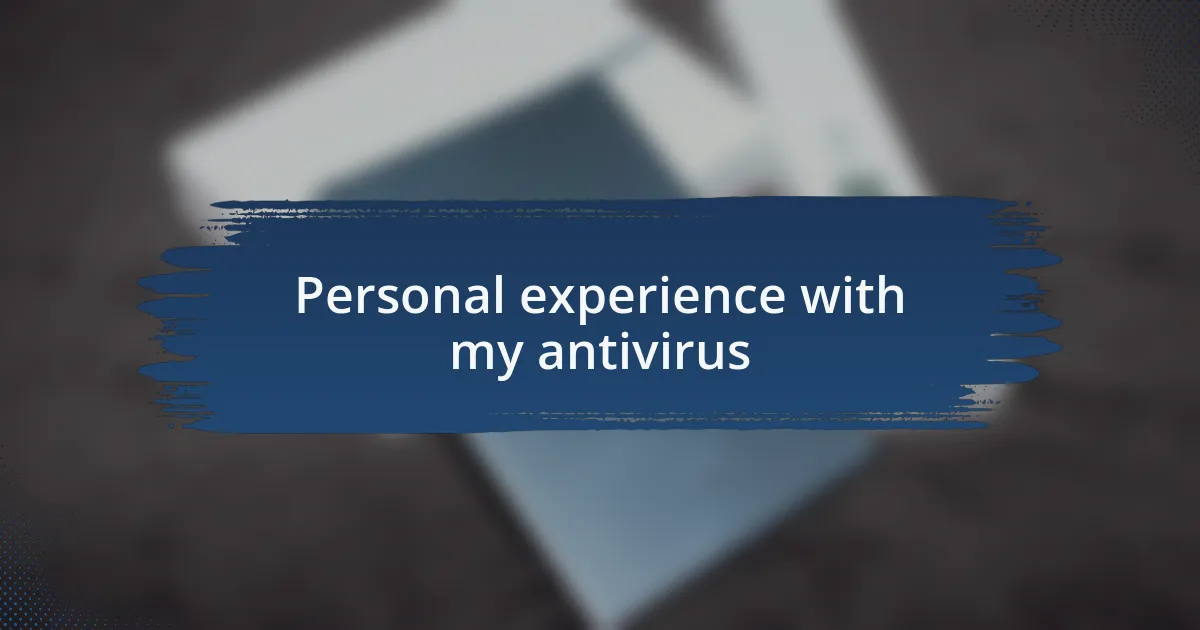
Personal experience with my antivirus
Navigating the world of antivirus programs can be a bit intimidating, but my experience has taught me the importance of choosing one that truly fits my needs. I recall the first time I encountered a virus — it felt overwhelming, and I was filled with anxiety, fearing I might lose important files. Since then, I’ve stuck with an antivirus that not only scans effectively but also helps me feel more secure, almost like having a digital safety net. Have you ever felt that sense of relief when your antivirus catches a potential threat?
Another aspect I’ve grown to appreciate is the user interface of my antivirus software. Initially, I struggled with complicated setups that made me question my tech skills. However, when I switched to a program that was intuitive and easy to navigate, it felt like a game changer. I could effortlessly adjust my settings and manage scans without needing a manual. Isn’t it reassuring when technology just works for you without added stress?
I’ve also had moments where my antivirus alerted me about suspicious activity in real time, and those instances were eye-opening. One evening, I received a notification while I was browsing an unfamiliar website. The software quickly blocked a malicious link, which made me realize how vital it is to have proactive protection. These experiences made me appreciate how my antivirus acts as a guardian, watching over my digital activities. Have you ever been grateful for a timely alert that kept you safe?